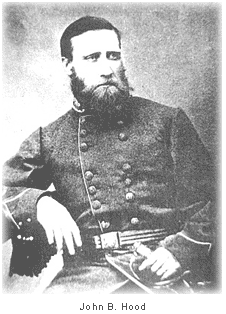In the spring of 1864, while Grant was in The Wilderness, William T. Sherman and 90,000 Union soldiers moved southward from Chattanooga toward Atlanta. A smaller Confederate force, about 60,000 men, was under the command of Joseph E. Johnston. Their role was to slow the Union advance and to try to disrupt the lines of supply as Sherman went farther into Southern territory.
Southern leaders were acutely aware of war weariness in the North. Their hope was to prolong the conflict into the fall and hope that Abraham Lincoln would be defeated in the Election of 1864. Anyone, it was thought, would offer more hope to the South than Lincoln.
 Johnston and Sherman engaged one another in a series of minor battles with the Confederates always managing to escape the full force of the Union army. The most significant battle occurred at Kennesaw Mountain in June 1864, a Confederate victory. Nevertheless, Jefferson Davis concluded that Johnston was too cautious and replaced him with John B. Hood.
Hood’s more aggressive efforts were not successful and the Confederate force retreated into the city of Atlanta. Sherman continued his campaign and prepared a siege, and sped matters along by cutting off railroad traffic into the city. Sherman's artillery devastated Atlanta, which suffered further losses from raging fires. Hood evacuated Atlanta On September 1, 1864; Sherman occupied it the following day, on September 2, 1864.
The fall of Atlanta was an event widely reported in the North and it played prominently in the reelection of Lincoln later that fall. The victory in Atlanta gave Sherman the opening he needed for his famous "March to the Sea," during which he destroyed much of the Confederacy's agricultural resources. Southern resentment towards Sherman's campaign remained a source of bitterness for decades.
Johnston and Sherman engaged one another in a series of minor battles with the Confederates always managing to escape the full force of the Union army. The most significant battle occurred at Kennesaw Mountain in June 1864, a Confederate victory. Nevertheless, Jefferson Davis concluded that Johnston was too cautious and replaced him with John B. Hood.
Hood’s more aggressive efforts were not successful and the Confederate force retreated into the city of Atlanta. Sherman continued his campaign and prepared a siege, and sped matters along by cutting off railroad traffic into the city. Sherman's artillery devastated Atlanta, which suffered further losses from raging fires. Hood evacuated Atlanta On September 1, 1864; Sherman occupied it the following day, on September 2, 1864.
The fall of Atlanta was an event widely reported in the North and it played prominently in the reelection of Lincoln later that fall. The victory in Atlanta gave Sherman the opening he needed for his famous "March to the Sea," during which he destroyed much of the Confederacy's agricultural resources. Southern resentment towards Sherman's campaign remained a source of bitterness for decades.